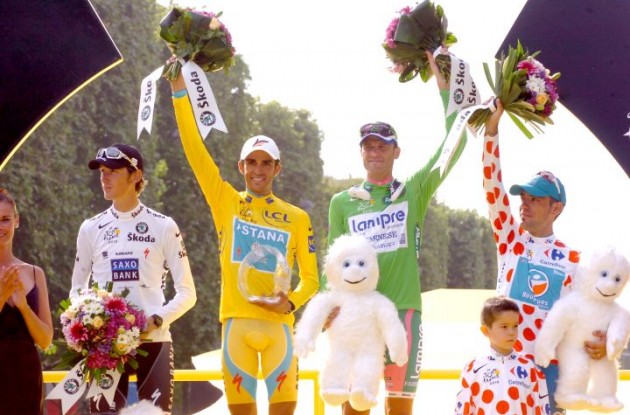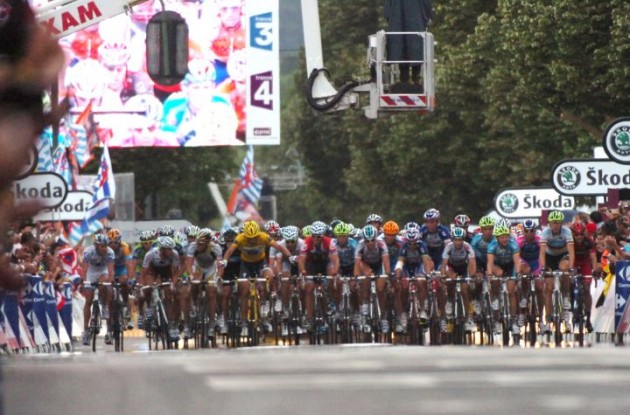Five Things to Watch in the Tour de France 2011
Less than 48 hours from now the biggest cycling event of the 2011 season - the legendary Tour de France Grand Tour - will start in Passage du Gois La Barre-de-Monts. The three-week race is known for its many historic events and experiences and the 2011 edition is not likely to disappoint the millions of viewers who follow the event closely from all five continents of the world.
Less than 48 hours from now the biggest cycling event of the 2011 season - the legendary Tour de France Grand Tour - will start in Passage du Gois La Barre-de-Monts. The three-week race is known for its many historic events and experiences and the 2011 edition is not likely to disappoint the millions of viewers who follow the event closely from all five continents of the world.
While many an article in various media will describe the Tour de France route, the stages and not least focus on the battle between the favorites for the final overall victory - Andy Schleck, Alberto Contador, Cadel Evans and Bradley Wiggins' names are on the lips of most cycling fans these days - this article will provide you with five ideas for alternative things to keep your eye out for while you're glued to the television screen during the next three weeks like a wee baby to its mother's breast.
Internal Team Rivalry Between Sprinters - Mark Cavendish VS. Matthew Goss and Thor Hushovd VS. Tyler Farrar
No riders are as known for their dominating personalities as pro sprinters. Some call them arrogant, some call them little children who hate being defeated by rivals. Some blame them for being addicted to the limelight of the podium and the gorgeous podium girls. What makes the situation even worse is when a team arrive at a Grand Tour like the Tour de France with two major sprinters as part of the team roster. This is the case for two dominant teams this year: Team Garmin-Cervelo and Team HTC-HighRoad.
Garmin-Cervélo's Tour roster features both Thor Hushovd and Tyler Farrar. The Norwegian God of Thunder hasn't had much success so far this season and is feeling the pressure of the World Champion jersey. Rumor has it that he's also feeling neglected within the team and plans to move to another team from the 2012 season. Tyler Farrar had a very successful 2010 season with two stage victories in the Vuelta a Espana and the Giro d'Italia and not least was he victorious in the Vattenfall Cyclassics in Hamburg. Except for a stage win in the 2011 Tirreno-Adriatico, impatient young Farrar has mostly been watching the backs of competing sprinters when crossing the finish line in races so far this season. Rumored to have been the final rider to be selected for the team's Tour roster further increases the pressure on Farrar's shoulders.
Team HTC-HighRoad also arrives at the Tour de France with two prominent sprinters. Mark Cavendish and Matt Goss. While Mark Cavendish has been one huge disappointment so far this season, internal rival Matt Goss has shined impressively on the roads of Europe, California and Australia. Having the largest ego of all current pro sprinters, Cavendish will be hard to control in the team bus and in the team hotels if he doesn't win at least a couple of stages in the first week of the Tour. Will the team bet its money on the experienced sprinter who has failed so far this season, or on the blossoming new star? Will we be watching Mark Cavendish in tears again this year, or will Goss and Cav go golfing together on the Tour's two rest days? Perhaps more importantly, how will the teammates of Goss and Cavendish react to this internal rivalry?
Passive and Gutless Riding
In the most recent editions of the Tour de France, we have witnessed how riders have repeatedly tried to reduce the intensity of the race and take every possible opportunity to slow down or even neutralize states. The Tour de France has been known for its high intensity since its inception more than a hundred years ago. The Tour de France has gotten its fame because it was the world's hardest race. Now the Giro d'Italia is taking over this role. If a rider falls of a mountain side, or if a rider is in danger of suffering permanent injury, then of course the other riders should slow down and the stage be neutralized, but certainly not in situations that are a regular part of pro road cycling. In recent years the new rider generations have been more and more wussbagish and the Tour has suffered from a lack of cannibals who dare to make the race interesting to watch. What a bore to viewers worldwide. Will the 2011 Tour de France develop like the Le Tour has done in recent years? Will no overall favorites dare to attack for real before the final climb of the Tour? Where are the real men and why have the young generations changed? Will the A.S.O. Tour owners dare make an example if necessary? The Tour de France ought to remain the world's toughest pro road cycling race and should not be converted into a kindergarten excursion - in great disrespect of the historic champions who went through hell to win Le Tour.
New Team Kits for the Tour de France
In recent years we've seen more and more examples of teams who reveal a new team kit with a new design for the Tour de France. Claiming this is done both in respect of the unique status of the Tour de France and because a special kit is needed for riders to be able to combat the very hot weather of France in July, this stunt from the teams and they clothing manufacturers is more likely done to further increase revenues and profits. We find it disrespectful to the true fans who follow their favorite teams throughout the season and who purchase the - already high priced - team kits at the beginning of the season. Many families have laboriously scrimped and saved to afford even just a team jersey for their sons and daughters only to find their kids highly disappointed and sad at the start of the Tour when they realize they're no longer wearing the same team jersey design as their big idol in the Tour. If the teams really do need a hot weather kit, how come they don't use the same design for the hot weather kit as they do for the clothing they wear during the rest of the season, and how come they don't wear a special hot weather kit in the even warmer Vuelta a Espana like they do in the Tour? How many teams will present new team kits for use in the Tour de France this year? Count and do the math yourself.
Radio Communication
The UCI has worked hard to introduce a radio communication ban over the past months, but has failed because of protests from team staff and not least many riders. The UCI claims radio communication on the road distorts the nature of the sport, making races more uninteresting and predictable to watch for viewers. Teams and riders claim the use of earpieces makes riders safer and, therefore, helps prevent accidents. Radio communication and earpieces will be used in this year's Tour de France. Roadcycling.com supports a radio ban because a ban will make pro cycling so much more exciting for viewers and readers worldwide. The riders must be treated as the humans they are and do not deserve to be remotely controlled by sports directors as if they were robots. Intelligent riders support the radio ban because the ban will make races much more interesting to watch for viewers, thereby attracting more viewers. This will increase sponsorship revenues, resulting in increased wages for riders. Further, the removal of radio communication will transfer a major part of the control and responsibility currently held by the sports directors to the riders. Over time this should result in increased wages for the riders. While you watch the 2011 Tour, consider how the stages would have been ridden if the UCI had succeeded at introducing a radio ban.
Doping and Anti-Doping
Yes, the ever popular D-word is unfortunately still relevant. With one, now-former, Omega Pharma-Lotto team official being fired earlier this week for importing illegal substances just in time for the Tour de France, some pro cycling analysts predict that doping will be a dominant topic during this year's Tour. The World Anti-Doping Agency (WADA) and the UCI are working as hard as ever to catch riders who cheat in the Tour and the French anti-doping authorities usually have at least one ace up their sleeve ready for use during the Le Tour. French daily newspaper L'Equipe, which is controlled by Tour de France owner A.S.O., may have some interesting stories in their news pipeline too. Will authorities make an example of Alberto Contador by excluding him during the Tour, forcing Team Saxo Bank-SunGard to replace its current captain with Chris Anker Sørensen? Will A.S.O. show signs of finally being ready to welcome back Michael Rasmussen to the Tour after he's been unwelcome in the Tour for so many years in spite of never testing non-negative for doping substances. Will any teams who have laid more or less dormant for a long time suddenly sparkle again in magic fashion in the Tour de France 2011? Stay tuned to Roadcycling.com and Roadcycling.mobi during the Tour to find out.
We wish all our readers around the globe a very joyful Tour. Let the game begin - and Vive Le Tour!
Views, thoughts and opinions from our readers are - as always - welcome in the discussion box below and in our forums.











